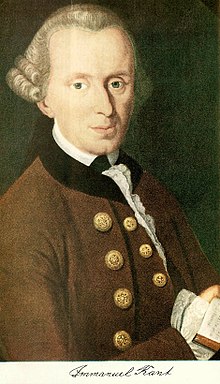Post-Kantianism
Immanuel Kant (/kænt/;German: [ɪˈmaːnu̯eːl kant]; 22 April 1724 – 12 February 1804) was a German philosopher who is considered a central figure in modern philosophy. Kant argued that the human mind creates the structure of human experience, that reason is the source of morality, that aesthetics arises from a faculty of disinterested judgment, that space and time are forms of our sensibility, and that the world as it is "in-itself" is independent of our concepts of it. Kant took himself to have effected a Copernican revolution in philosophy, akin to Copernicus' reversal of the age-old belief that the sun revolved around the earth. His beliefs continue to have a major influence on contemporary philosophy, especially the fields of metaphysics, epistemology, ethics, political theory, and aesthetics.
Politically, Kant was one of the earliest exponents of the idea that perpetual peace could be secured through universal democracy and international cooperation. He believed that this will be the eventual outcome of universal history, although it is not rationally planned. The exact nature of Kant's religious ideas continues to be the subject of especially heated philosophical dispute, with viewpoints ranging from the idea that Kant was an early and radical exponent of atheism who finally exploded the ontological argument for God's existence, to more critical treatments epitomized by Nietzsche who claimed that Kant had "theologian blood" and that Kant was merely a sophisticated apologist for traditional Christian religious belief, writing that "Kant wanted to prove, in a way that would dumbfound the common man, that the common man was right: that was the secret joke of this soul."
...
Wikipedia


